Audio Version Of The Blog – 2/12/24
Listen to an Audio Version of the Blog
Download:MP3 Audio

Listen to an Audio Version of the Blog
Download:MP3 Audio

Michael Laitman on the Times of Israel: “Can everyone heal others?”
There is a phenomenon that when we are close to someone we care about, our breathing and heartbeat can synchronize. For instance, when someone we care about is feeling unwell, we can hold their hand and it will alleviate their suffering. In such situations, the inner energies of one flow into the other through tactile contact, regulating their energies.
One of the important points here is that specifically a loved one can affect such a state. “A loved one” can mean in spirit, temperament or inner connection. If the two people are not close, then it is unlikely that they can operate in such a way.
Therefore, if we want to help people who are ill, we need to first attune ourselves to viewing them as close. We have it in our powers to do just that. Doing so requires feeling their inner world, the places where they are imbalanced, and trying to influence their return to a balanced state.
The healthy person in such a relationship is the one who is responsible for the one needing help. All the latter one can do is comply – an action that is also not so simple. The rest of the relationship, however, depends on the healthy person. In short, there is one whose job is to ask for help, and then the one who can help should do everything in their power to help.
One of my students asked me whether we could expand this concept to humanity, whether we could somehow help humanity through the tough times it is experiencing. It is indeed a problem. To start with, how do we know if pulling humanity out of its current state is for its best? If humanity has entered difficult states, it is for a reason. We should think about how humanity can be guided to a much better state, but exiting the descent it is in might not be the best course of action.
In the meantime, we continue studying, teaching and sharing the wisdom of Kabbalah. It offers a way out of suffering by providing the possibility to ascend through reaching out to and supporting each other. We need nothing else. If we mutually support and encourage each other, we can rise up to a new life together.
Kabbalah’s core principle is “love your neighbor as yourself,” which is also its toughest point. It means that we should increase our connection to others voluntarily, as if in the dark, i.e., when our self-serving natures feel no need to make us want to connect with other people. However, if we fail to actively seek positive human connection above our divisive drives, we are doomed.
The very moment we restrict every resistance we have to positively connecting with others is the same moment we rise above suffering. If we lag in our voluntary efforts to urge our connection above differences, then suffering will force us. The latter is like a person getting hit by a stick over and over again until he eventually lands on a path to happiness.
The wisdom of Kabbalah explains the integral laws of nature and the human being’s role in it. By learning the wisdom of Kabbalah, we can draw nature’s forces of connection that help us rise in connection above our differences. Doing so advances human consciousness ahead of the so-called “steamroller of evolution” – the natural evolutionary trajectory that leads to more and more suffering.
[325086]
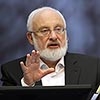 Comment: There is a quote: “If all efforts do not lead to anything and people still destroy each other, then the Universe will not shed a single tear over them.”
Comment: There is a quote: “If all efforts do not lead to anything and people still destroy each other, then the Universe will not shed a single tear over them.”
Please explain this ruthless quote that the universe does not care.
My Response: No, not that it doesn’t care, it’s just a law that exists in the universe. If people cannot use it correctly, they will destroy each other, and the universe has nothing to regret.
Question: What is this universe that does not regret that we will destroy each other?
Answer: Why should anyone be sorry?
Question: But is there any law of mercy?
Answer: No. Where does it come from?
Comment: I thought the law of mercy came from above. I thought everything was based on this law. I thought that this was the main law of life in general.
My Response: Why would it be?! I look at the inanimate, vegetative, and animate nature and do not see any observance of such laws in them. I think that the worst trait of man is that he invents for himself the future or the existence around him that he desires.
Question: So this is violence? Is man doing violence to nature?
Answer: Yes. And then he demands from nature: “Give it to me!”
Comment: That is, you are merciful, and I want everyone around to be merciful.
My Response: The answer is yes. If we were to reason soberly about nature, we would not demand from nature, but would demand from ourselves, we would demand our correct attitude to ourselves, to others, to nature—to everything. And then we might have a guess about how the universe exists, and how we can rise above it.
Comment: So, I don’t demand from the universe, “Be merciful to me,” but I demand from myself, “Be merciful to others”?
My Response: Yes.
Question: Why should I be merciful to others?
Answer: I have to do for others all the good and kind things that I would like to wish for myself. And in no case should I think that I will receive some kind of reward for this. No way!
Comment: This second part is very difficult, to receive nothing in return.
My Response: That’s the whole point of the first part.
Question: Does this bring me into balance with the universe if I start moving like that, as you say?
Answer: If so, then yes. And then there will be no destruction, no self-destruction.
[323058]
From KabTV’s “News with Dr. Michael Laitman” 11/27/23
Related Material:
If They Came to Kill You
Mercy Is Contact with the Creator
Three Points On A Stable Foundation
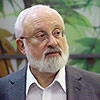 Question: Alexander the Great, the great commander, marched on Jerusalem. He was already great then, he had conquered half the world. And it is written in the Talmud that the high priest Shimon HaTzadik came out to meet him, and with him the elders.
Question: Alexander the Great, the great commander, marched on Jerusalem. He was already great then, he had conquered half the world. And it is written in the Talmud that the high priest Shimon HaTzadik came out to meet him, and with him the elders.
It is written as follows: “They moved all night by torchlight, and at dawn they met with the advance detachments of the Macedonian. We stood in their way. The squad stopped. Alexander the Great descended from the chariot and knelt before the high priest. The assault on Jerusalem has been canceled.”
From that moment on, the name Alexander was included in the list of Jewish names.
The question is very important for today, what does force gives in to? You are equipped, you have got half the world behind you, you have conquered half the world, and you give up!
Answer: There is a higher power, and Alexander felt it. After he conquered the whole world, he was not blinded by it. He felt the power in this elder and therefore got off the chariot and bowed before the great wisdom that he felt in this man.
Question: Still, how to emanate it? I understand, this is a great High Priest, this is a connection with a upper force. But still, now, today, when all this is happening, is it possible to stand up against weapons like this and win? Is it possible or not?
Answer: It depends on who you are going to talk to.
Comment: After all, you see nobility behind Alexander the Great.
My Response: Not only that. He is a smart man, he is a great man who did not just go out to conquer the world. He came out to fill this world with science and enlightenment. And first of all, he wanted to leave it in those cities through which his troops passed.
He wanted to make this world, of course, Hellenic, but it was enlightened. That is, to raise this pagan world to the level of enlightenment.
Question: What is the spirit that a person radiates that conquers everything? I am asking about the high priest now.
Answer: The high priest is obligated to stay in Jerusalem; he has nowhere to go. He has a completely different mission. He must fill the earth with spirit.
Question: And if he came out now and met the Macedonian, what does that mean?
Answer: It means that two great men, strength and intelligence, came together, each understanding the other, respecting each other, and decided to save Jerusalem based on this.
Question: Was the high priest’s idea to save Jerusalem?
Answer: Yes.
Question: When you say “spirit,” do you necessarily mean an upper force in this concept? Is there no spirit without a higher power?
Answer: No, it does not exist. The spirit is the upper force, which, by the way, exists generally in any person. It only depends on how much a person wants to elevate this spirit above him. Let’s say Hitler could not do it, but Alexander the Great could. Therefore, to this day, Jews often call their children Alexander in honor of Alexander the Great.
Comment: There is no other case like this in history.
Answer: There is no such thing, in any way.
[323797]
From KabTV’s “News with Dr. Michael Laitman” 12/25/23
Related Material:
The High Priest’s Qualities, Part 1
The High Priest’s Qualities, Part 2
The High Priest’s Qualities, Part 3
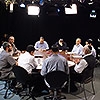 Question: Is it worth talking to the ten about actions through force, or is it an individual inner work through which we seek a connection with the Creator and ask for strength to overcome resistance?
Question: Is it worth talking to the ten about actions through force, or is it an individual inner work through which we seek a connection with the Creator and ask for strength to overcome resistance?
Answer: We can talk about it a little bit among ourselves, but preferably less. In any case we need to cheer each other up.
Usually, in the ten, we show only good aspirations and not those that distance us from each other. The main thing is to be all together as if we are embracing and moving forward. There are no boundaries in this regard.
[324693]
From the Daily Kabbalah Lesson 2/1/24, Writings of Baal HaSulam “What Is ‘Hurry, My Beloved,’ in the Work?”
Related Material:
Together We Can Do Anything
Be Together as One Wall
I Am Asking For My Brothers
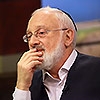 Question: There is a little puzzle, three frogs were sitting on a log, one decided to jump. How many frogs are left on the log?
Question: There is a little puzzle, three frogs were sitting on a log, one decided to jump. How many frogs are left on the log?
Answer: This is an old puzzle. “Decided to jump” and “jumped” are not the same thing.
Question: Exactly! So, three frogs are still sitting on the log. Sometimes, we think we’ve jumped, but in reality, we’re still deciding whether to jump. I have a question: How do you make decisions correctly?
Answer: You can make a decision correctly if you absolutely know its outcome in advance and are already in that outcome. It’s like looking at the present from the future.
Question: So, you have to anticipate and foresee the result?
Answer: Absolutely! What else is a decision for? It’s a decision about the future.
Question: You sort of place yourself in it and then make the decision?
Answer: Of course.
Question: When you decide, do you have to jump right away? Is there any time for reflection?
Answer: If you have decided definitively, rechecked yourself, and conclusively decided, then you must act. Otherwise, every minute is a delay.
Question: Tell me, how do you reassess? Do you reassess yourself? Measure seven times…
Answer: No. I don’t know about seven times, but you have to assess. Because it shouldn’t depend on your momentary mood or any conditions. It should be a normal, firm decision.
Question: So, if you made the decision, after all these checks, you have to jump?
Answer: Yes.
Question: But what if you made the wrong decision? Checked everything, did everything, and made the wrong decision.
Answer: How do you know it’s wrong?
Comment: You ended up not where you wanted.
My Response: But that’s after the decision.
Comment: After I’ve already jumped.
My Response: After implementation?
Question: Yes, exactly. I realized I made the wrong decision. What should I do about it?
Answer: Do nothing.
Question: But I beat myself up over it! Checked everything, jumped, and everything’s wrong?!
Answer: There’s nothing you can do. Nothing more to do, nothing to blame.
Question: Don’t blame yourself?
Answer: No, under no circumstances!
Question: How do you not fall into doing so?
Answer: Attribute all that to the Creator.
Question: So, measure beforehand and after it happened…
Answer: The Creator did it. Absolutely clearly, the Creator.
Comment: That is, we have now come to the golden rule. I check everything…
My Response: I decide, I act, and the rest is up to the Creator.
Question: And then the result is the Creator?
Answer: Yes.
Question: No regrets, nothing?
Answer: Nothing. That’s how it was intended from the beginning.
Question: So, He was spinning me around from the start, I was reassessing it and it wasn’t me doing it? He was the one twisting me?
If one could live like this, there would be nothing to regret at all.
Answer: Then live like that.
Comment: “Live like that”! If only we could learn to live like that.
My Response: Don’t regret anything and don’t think about anything at all! Everything is arranged from above.
[324359]
From KabTV’s “News with Dr. Michael Laitman” 12/11/23
Related Material:
Toss a Coin or Think?
Advice For Making Decisions
Where To Look For The Right Solution?
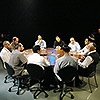 Question: I am trying to understand the mechanism of transitioning from a state where you clearly see the faults of a friend in a group to a state where you rise above this and suddenly begin to see his best qualities. How does this happen?
Question: I am trying to understand the mechanism of transitioning from a state where you clearly see the faults of a friend in a group to a state where you rise above this and suddenly begin to see his best qualities. How does this happen?
Answer: You must imagine that your friend is above you. As if you bow before him and treat him with respect; you consider him great, and thus you start to want to adhere to him.
Then a special connection appears between you, because you, by wanting to rise to his level, want to get closer to him, hold onto him, and the same with each of the ten people. This way you rise together with them.
Your nine friends treat you exactly the same way you treat them. Therefore, you get a Kabbalistic ten, a group that elevates itself.
Question: Why does this happen?
Answer: Each of the ten contains a piece of upper energy, upper light. If you want to highlight this piece, to raise it, and if you treat all nine friends as greater than you, then you kind of hold onto them and they raise you. And everyone, in relation to everyone, does the same.
[324435]
From KabTV’s “Practical Kabbalah” 1/16/24
Related Material:
Pulling Up To The Ten
A Method For Spiritual Upliftment
Truth And Benefit
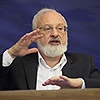 Question: The Malchut of the upper is the Keter of the lower. How do they merge in similarity? In Malchut, as it is said, there is a calculation. And in Keter, it turns out, there is no calculation?
Question: The Malchut of the upper is the Keter of the lower. How do they merge in similarity? In Malchut, as it is said, there is a calculation. And in Keter, it turns out, there is no calculation?
Answer: Keter has no calculation. If they ask from it, it gives. We must bring our desires to receive into the Malchut of the lower one in order to pass them on.
And then our desires will rise to Keter, from it the light will pass to Malchut, and from there we will receive it.
Question: You said that there is no Malchut without Keter. Is there Keter without Malchut? Can they be considered as a whole?
Answer: No, Keter exists without Malchut. But what is its purpose? In bringing all the Sefirot to the very end and Malchut will also become giver like Keter.
[324678]
From the Daily Kabbalah Lesson 1/30/24, Writings of Baal HaSulam “What Does It Mean that the Sitra Achra Is Called ‘Malchut without a Crown’?”
Related Material:
Between Keter And Malchut
Malchut That Wanted To Attain Keter
Between Malchut and Bina
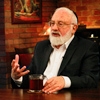 Question: How can we feel pain for the Creator?
Question: How can we feel pain for the Creator?
Answer: There is no pain in you because there is no Creator in you.
To feel it, you need to work in accordance to the recommendations of Kabbalists and not the way you want.
[324726]
From the 1st part of the Daily Kabbalah Lesson 1/30/24, Writings of Rabash “What Is, ‘As I Am for Nothing, so You Are for Nothing,’ in the Work?”
Related Material:
If You Are Not Wicked, Why Do You Need the Creator?
Do Not Obscure the Creator with Yourself
You Cannot Run Away From The Creator!
Preparation to the Lesson
1st part of the Lesson — Writings of Rabash, “What Is, ‘The Smell of His Garments,’ in the Work?”
2nd part of the Lesson — Writings of Baal HaSulam, “Foreword to The Book of Zohar
Selected Highlights